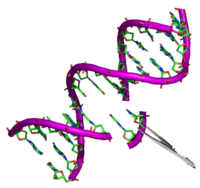
Photo from wikipedia
Foodborne pathogens represent a significant cause of negative impacts on human health and the economy worldwide. Unfortunately, information about epidemiological insights in Latin American countries is scarce. The consumption of… Click to show full abstract
Foodborne pathogens represent a significant cause of negative impacts on human health and the economy worldwide. Unfortunately, information about epidemiological insights in Latin American countries is scarce. The consumption of ready-to-eat street food in Ecuador is extensive, and information about the presence of foodborne pathogens, their virulence factors, and antimicrobial resistance is negligible. This data includes the occurrence, phenotypic antibiotic resistance profiles, and antibiotic resistance genes of Enterobacterales isolated from ready-to-eat street food in Ambato, central Ecuador during 2020 and 2021. The most common genera detected were Escherichia coli, Klebsiella spp., and Cronobacter spp. Agar disk diffusion assays were performed to determine their phenotypic resistance. The presence of antibiotic resistance genes conferring resistance against colistin, β-Lactams, aminoglycosides, tetracyclines, sulfonamides, fluoroquinolones, and amphenicols was detected via polymerase chain reaction (PCR) amplification.
Journal Title: F1000Research
Year Published: 2022
Link to full text (if available)
Share on Social Media: Sign Up to like & get
recommendations!